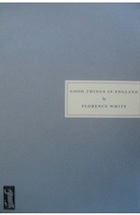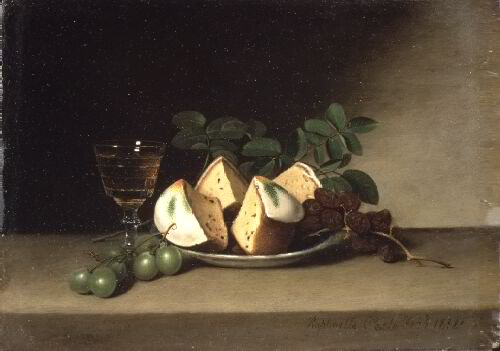This Sunday’s Observer Food Monthly features a countdown of the 50 best cookbooks ever. One of them is “Good Things in England” by Florence White. Part cookbook, part historical document, it is described as ‘A marvellous compendium of recipes’ and ‘one of the most influential cookery books of the C20th.’  Ms. White, the country’s first ever freelance food journalist, believed that ‘‘we had the finest cookery in the world but it has been nearly lost by neglect” and that English cooking was dying out, crushed by “foreign cookery and modern fads.” In 1932 she authored  “Good Things in England,” a pioneering collection of  853 regional recipes, dating back to the 14th century. A lost classic, it was finally republished by Persephone Books in 1999 as a facsimile of the original edition.
So if you think British food was always just sandwiches on white bread with more mayo than meat, think again. Naturally, all the dishes have evocative names like “The Judge’s Circuit Soup”, “Stoodleigh Rectory Stew for the Hunting Season”, “Colonel Kenney Herbert’s Madras Chicken Curry”, and “Camp Treacle Pudding”. Learn how to make Thomas Hardy’s frumenty and Izaak Walton’s Minnow Tansies and pickled elder buds. Then there are the cakes. Eccles cakes, Banbury cakes, Coventry Godcakes, Hawkshead cake and Chorley cakes. Eccles cakes are crusty pastry puffs filled with a special mixture of raisins and mincemeat and sprinkled with sugar.
The history of the Eccles cake is customarily steeped mythology. in In 1769, Mrs Elizabeth Raffald, the snooty nosed, bonneted housekeeper and owner of a confectioner’s shop in Cheshire, wrote an influential cookery book, “The Experienced English Housekeeper”, which became a best seller.  The book contained a recipe for “sweet patties” with ingredients identifiably similar to the Eccles cakes of today.  It is said Mrs Raffald gave her own recipe as a wedding present to a cookery-mad servant girl who had served her well and was going to live at Eccles, and that the girl made and sold the cake so successfully that she made a fortune.

From Persephone Books, “Good Things in England” by Florence White


